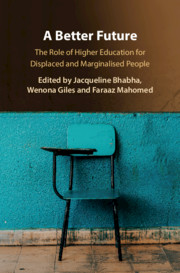Book contents
- A Better Future
- A Better Future
- Copyright page
- Contents
- Figures
- Tables
- Notes on Contributors
- Introduction
- Part I Encountering Marginalisation
- Part II Deconstructing Marginalisation
- Part III Confronting Marginalisation
- Chapter 14 ‘Now I Constantly Challenge Society by Bringing My Existence Forward’
- Chapter 15 Towards an Emergent Theory of Fallism (and the Fall of the White-Liberal-University in South Africa)
- Chapter 16 Family Sacrifice, Faltering Systems
- Chapter 17 DACAmented
- Chapter 18 Building Ethical Relationships through the Borderless Higher Education for Refugees Project in Dadaab, Kenya
- Chapter 19 The ‘Jungle’ Is Here; The Jungle Is Outside
- Chapter 20 Culture, Gender and Technology
- Index
- References
Chapter 19 - The ‘Jungle’ Is Here; The Jungle Is Outside
University Teaching in the Calais Refugee Camp
from Part III - Confronting Marginalisation
Published online by Cambridge University Press: 06 September 2020
- A Better Future
- A Better Future
- Copyright page
- Contents
- Figures
- Tables
- Notes on Contributors
- Introduction
- Part I Encountering Marginalisation
- Part II Deconstructing Marginalisation
- Part III Confronting Marginalisation
- Chapter 14 ‘Now I Constantly Challenge Society by Bringing My Existence Forward’
- Chapter 15 Towards an Emergent Theory of Fallism (and the Fall of the White-Liberal-University in South Africa)
- Chapter 16 Family Sacrifice, Faltering Systems
- Chapter 17 DACAmented
- Chapter 18 Building Ethical Relationships through the Borderless Higher Education for Refugees Project in Dadaab, Kenya
- Chapter 19 The ‘Jungle’ Is Here; The Jungle Is Outside
- Chapter 20 Culture, Gender and Technology
- Index
- References
Summary
This chapter explores the borders of education in relation to contemporary refugee issues in Europe, specifically addressing the informal ‘Jungle’ camp in Calais, Northern France, where University of East London (UEL) colleagues taught an accredited Life Stories short course between September 2015 and October 2016. It suggests that this pedagogy apparently beyond the borders of the conventional university is in some ways precisely the terrain of the university and education more generally. It disassembles ‘education’ itself, in a context where it was at the same time a humanitarian response, a human right and a political field of reciprocity, traversed by processes of coalition, commoning and association. Within this field, the outside of the camp, more than the camp itself, might appear as a jungle, irrational and denying humanity, while the ‘Jungle’ space itself contested neoliberal education and counterposed its own ‘university’.
Keywords
Information
- Type
- Chapter
- Information
- A Better FutureThe Role of Higher Education for Displaced and Marginalised People, pp. 427 - 450Publisher: Cambridge University PressPrint publication year: 2020
References
Accessibility standard: Unknown
Why this information is here
This section outlines the accessibility features of this content - including support for screen readers, full keyboard navigation and high-contrast display options. This may not be relevant for you.Accessibility Information
- 3
- Cited by
